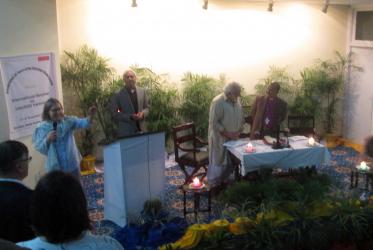Displaying 61 - 80 of 148
26 April 2018
WCC extends greetings as Buddhists observe Vesakh
25 April 2018
WCC condemns attack on church in Pakistan
17 December 2017
Global evangelism group explores “the hope within us”
13 December 2017
WCC Executive Committee issues statement on bishop from Philippines
18 November 2017
In Pakistan, Christian Study Centre celebrates 50 years
10 November 2017
Learning and networking flourishes at WCC Ecumenical Officers Meeting
28 September 2017
Women’s mentoring focus of Thailand gathering
23 April 2017
“Overcoming economic injustice” vision of WCC’s Athena Peralta
23 February 2017
WCC expresses sorrow in wake of attack on Muslim shrine in Pakistan
17 February 2017
WCC offers condolences upon death of Anglican Archbishop Turei
13 January 2017










